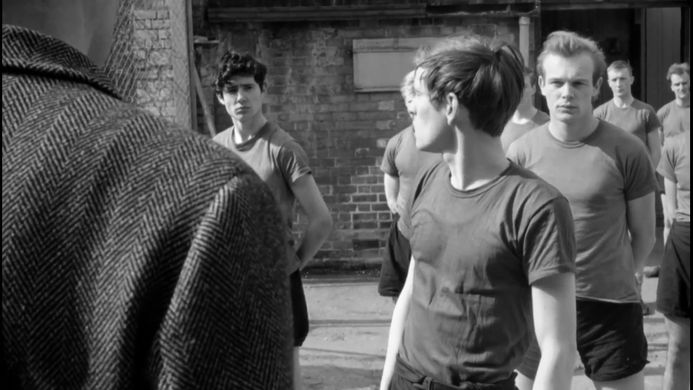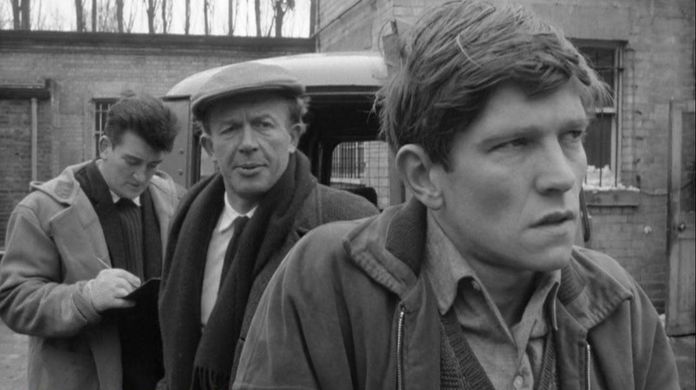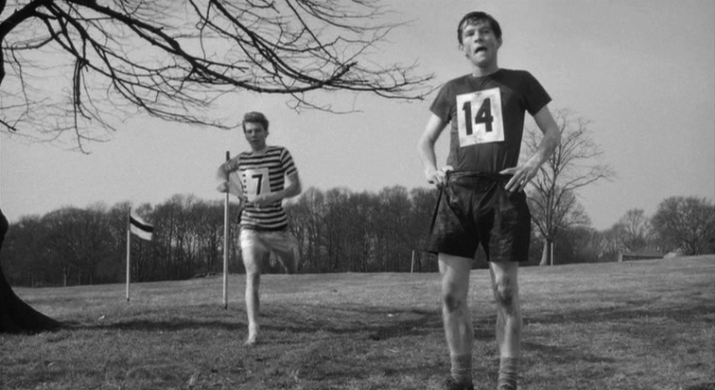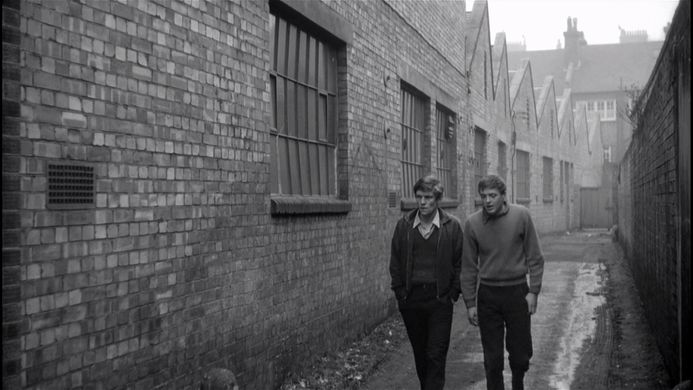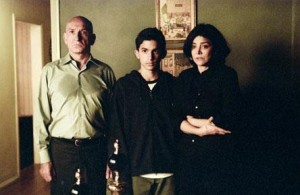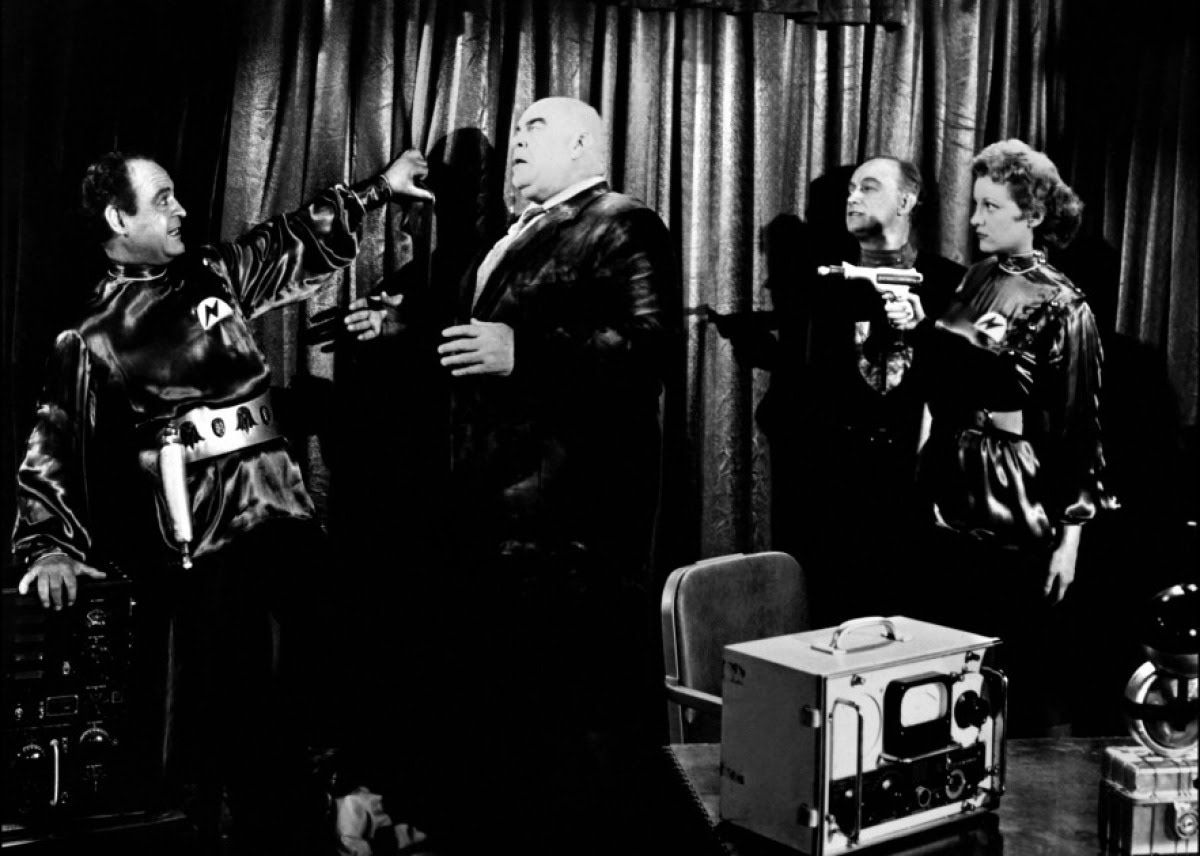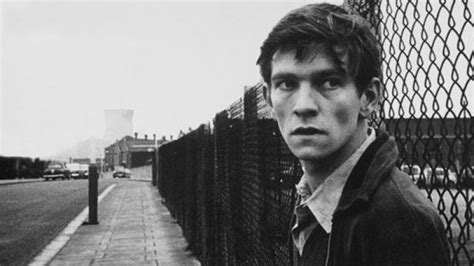 There is more to this bleak story of a young man in a juvenile detention facility than just another bit of “social realism” or the usual formula of redemption-through-sport. There are layers and layers in Alan Sillitoe’s story, and Ralph Richardson’s film gets many of them across. It’s about being controlled, being used, being forced to play roles for others, and finally rebelling against it in a way that makes some sense. The actors clearly understood these subtleties, and avoided clichés in interpreting the roles. Tom Courtney became a star on the strength of this performance. Michael Redgrave, by then a venerable icon, worked every scene with him in delicate balance. This film still has a high reputation in the British cinema, and justly so.
There is more to this bleak story of a young man in a juvenile detention facility than just another bit of “social realism” or the usual formula of redemption-through-sport. There are layers and layers in Alan Sillitoe’s story, and Ralph Richardson’s film gets many of them across. It’s about being controlled, being used, being forced to play roles for others, and finally rebelling against it in a way that makes some sense. The actors clearly understood these subtleties, and avoided clichés in interpreting the roles. Tom Courtney became a star on the strength of this performance. Michael Redgrave, by then a venerable icon, worked every scene with him in delicate balance. This film still has a high reputation in the British cinema, and justly so.
Category Archives: DU - Viewing 2006
(Richardson 1962) The Loneliness of the Long Distance Runner
(Wilcox 1956) Forbidden Planet
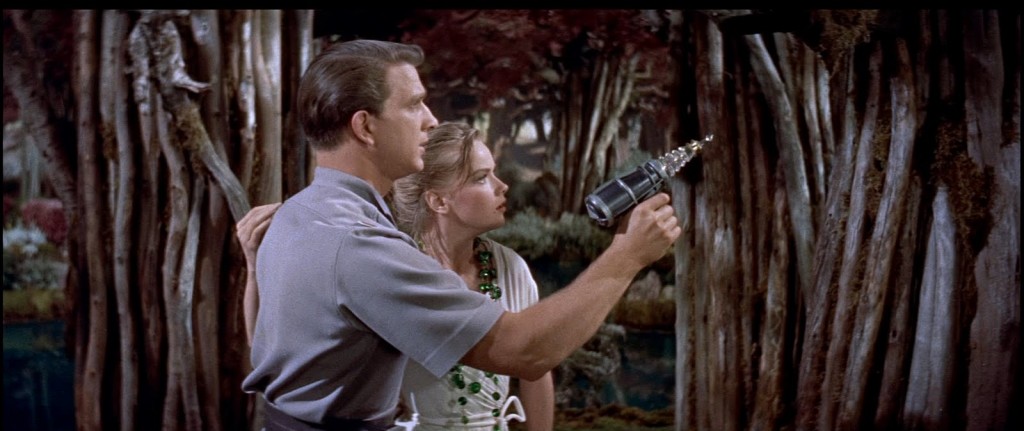 How many times have I seen Forbidden Planet? I’m not sure, but it is one of my earliest childhood memories. Despite much that is quaint and embarrassing, it still holds up as one the few films with the essential “sense-of-wonder” component central to literary Science Fiction, but almost always absent from SF on film.
How many times have I seen Forbidden Planet? I’m not sure, but it is one of my earliest childhood memories. Despite much that is quaint and embarrassing, it still holds up as one the few films with the essential “sense-of-wonder” component central to literary Science Fiction, but almost always absent from SF on film.
Some trivia about the wonderful, pioneering electronic score by husband and wife team Louis and Bebe Barron: The film’s producers originally wanted Harry Partch to score the film. The Barrons were only supposed to make a few effects. But the first sample they produced convinced the producers to go with them for the entire film. During the film’s preview, when the first electronic “tonalities” came on, the audience broke out in spontaneous applause. Many people at the time found the quite terrifying. Unfortunately, the musicians union would not recognize what they were doing as “music”, and the Barrons never did another film score.
(Jarmusch 2005) Broken Flowers
 My friend Skye Sepp brought this film to my attention. I’ve been burnt a few times by movies starring Bill Murray. But he is perfect in this one. The film is a character comedy. It isn’t a “romantic comedy”, since there is no successful romantic resolution. It has a very contemporary feeling. The characters and setting are definitely now — that is, the United States as it really is in 2005, and not some behind-the-times facsimile generated by writers and film-makers who have lost touch with the culture. Jim Jarmusch wrote and directed the film, and it’s obvious that he keeps his eyes and ears open, and knows his own society. Any American who knows how to use Ethiopian pop music in a film, in a way that shows a little respect, plainly has his finger on the pulse.
My friend Skye Sepp brought this film to my attention. I’ve been burnt a few times by movies starring Bill Murray. But he is perfect in this one. The film is a character comedy. It isn’t a “romantic comedy”, since there is no successful romantic resolution. It has a very contemporary feeling. The characters and setting are definitely now — that is, the United States as it really is in 2005, and not some behind-the-times facsimile generated by writers and film-makers who have lost touch with the culture. Jim Jarmusch wrote and directed the film, and it’s obvious that he keeps his eyes and ears open, and knows his own society. Any American who knows how to use Ethiopian pop music in a film, in a way that shows a little respect, plainly has his finger on the pulse.
FILMS OCTOBER-DECEMBER 2006
(Armstrong 1999) MidSomer Murders: Ep.9 — Blood Will Out
(L’Ecuyer 2004) Prom Queen
(Gaudreault 2003) Mambo Italiano
(Asquith 1952) The Importance of Being Earnest
(Ratushniak 2004) Iron Men, Wooden Ladders
(Hitchcock 1955) To Catch a Thief
(Asquith 1948) The Winslow Boy
Read more »
(Perelman 2003) House of Sand and Fog
This is a good film. It’s based on a novel by Andre Dubus III, which I haven’t read*. It was the first feature film of Canadian director Vadim Perelman, who had made a reputation with music videos and commercials. Apparently, novelist and director worked together intimately. The cast, Jennifer Connelly, Ben Kingsley, Shohreh Aghdashloo, Ron Eldard, Frances Fisher, Kim Dickens, and Jonathan Ahdout, find every subtlety possible in the characters. This was possible because the characters are well conceived, multi-dimensional, and real. The story is pure Shakespeare. Two people have equally just claims to owning a house. Nothing special, just an ordinary little house with a view of the sea. One is an Iranian immigrant, played to perfection by Ben Kingsley, who desperately needs the house to hold his family together and retain his much injured pride. The other is a lonely woman who has both isolated herself and been isolated, and in the course of the struggle earned the love of a psychologically fragile cop. What begins as a low-key dispute gradually builds in tension and complexity, and unfolds with the inexorable steps to tragedy that Shakespeare perfected, and few dramatists since have learned.
*[I read it the next month]
(Wallace 1990) Stephen King’s It, Part 2
 My friend Isaac and I howled with laughter throughout this long and absurd film. Children in a small town are menaced by evil cosmic forces in the form of a leering clown, played by Tim Curry. When they grow up, they have to do it all over again. The cosmic forces, apparently, can be defeated by group hugs.
My friend Isaac and I howled with laughter throughout this long and absurd film. Children in a small town are menaced by evil cosmic forces in the form of a leering clown, played by Tim Curry. When they grow up, they have to do it all over again. The cosmic forces, apparently, can be defeated by group hugs.
(Wood 1959) Plan 9 From Outer Space
It grows on you with every viewing. Plan 9 is the most notorious film by Ed Wood, Jr., who was voted the worst film director or all time. It is loved by all who aspire not to be Ed Wood, and gives a shiver to those of us who come frighteningly close to being Ed Wood. It combines the inability to master the most elementary film techniques with a surrealistic mangling of the English language. Some of Wood’s bizarre and horrible phrasing approaches accidental poetry.
I had the great pleasure of showing it to a first-time viewer, my good friend Isaac White. Watching him react to the film — especially the scientific explanations “this can of gasoline, the sun, is connected to this rubber ball, the Earth by a line of gasoline.…” “a particle of light is composed of many atoms” — gave me more fun than I’ve had in awhile. You can only see Plan 9 for the first time once in your life. The experience cannot be repeated, and you cannot be the same person, after it has happened. Read more »
(Moore 2001 [released 2004] ) Ian Rankin’s Rebus: Mortal Causes
 I’ve been reading some of Ian Rankin’s fine hardboiled detective novels, and this BBC television adaptation is a fair rendering of them. The innovative camera work turns the alleys and housing projects of Edinburgh into an expressionist nether-world. The main character, inspector Rebus (ably played by John Hannah), is represented a bit younger, and the musical references that fill the books are only given an occasional nod. But watching the dramatizations will not spoil the books for you. They are not “who-done-its” nearly as much as “why-done-its”.
I’ve been reading some of Ian Rankin’s fine hardboiled detective novels, and this BBC television adaptation is a fair rendering of them. The innovative camera work turns the alleys and housing projects of Edinburgh into an expressionist nether-world. The main character, inspector Rebus (ably played by John Hannah), is represented a bit younger, and the musical references that fill the books are only given an occasional nod. But watching the dramatizations will not spoil the books for you. They are not “who-done-its” nearly as much as “why-done-its”.
(L’Ecuyer 2004) Prom Queen ; (Gaudreault 2003) Mambo Italiano
Two recent Canadian movies about gay issues. One is a docu-drama about the 2002 Charter of Rights court challenge made by Mark Hall, a high school student who was forbidden to take his male date to the prom at a Catholic school. On the whole, this is done with a light touch, treating it as a romantic comedy, rather than instructive melodrama. The court case was pretty much a forgone conclusion (the Canadian Charter of Rights is pretty damn clear on the matter), and the boy’s parents and school mates were on his side. The school authorities merely looked foolish to everyone.
 Mambo Italiano, is intended as an offbeat comedy, but it has some genuinely moving dramatic scenes. It’s done in a style reminiscent of the TV show Arrested Development, mixed with a bit of My Big Fat Greek Wedding. Angelo (Luke Kirby) has two problems. A small one: he’s gay, in the closet, and romancing a cop. A big one: his family is Italian. Specifically, his family is part of that intense subculture of Montreal’s la petite Italie. (“When I came to this country, nobody told me there were two Americas, the real one, America, and a fake one, Canada. And then they didn’t tell me there were two Canadas, the real one, Ontario, and the fake one, Quebec!”). The Italian-Canadian comedy is painted in broad, exaggerated strokes, but the whole story is done in such a way as to demonstrate the fundamental absurdity of all the hero’s problems.
Mambo Italiano, is intended as an offbeat comedy, but it has some genuinely moving dramatic scenes. It’s done in a style reminiscent of the TV show Arrested Development, mixed with a bit of My Big Fat Greek Wedding. Angelo (Luke Kirby) has two problems. A small one: he’s gay, in the closet, and romancing a cop. A big one: his family is Italian. Specifically, his family is part of that intense subculture of Montreal’s la petite Italie. (“When I came to this country, nobody told me there were two Americas, the real one, America, and a fake one, Canada. And then they didn’t tell me there were two Canadas, the real one, Ontario, and the fake one, Quebec!”). The Italian-Canadian comedy is painted in broad, exaggerated strokes, but the whole story is done in such a way as to demonstrate the fundamental absurdity of all the hero’s problems.  Within the cartoon framework, there are many scenes that ring true. It’s more about the stress of being a ping-pong ball among family members and community pressures than about the problems of coming out. His cop boyfriend, believably, caves in to family pressure and marries a “nice Italian girl”, an outcome made certain when you look back at his cowardly behaviour when he was in high school. There are moments in the film that are genuinely hilarious, not because of the absurdist joke-style of the film, but because they are bitter reality.
Within the cartoon framework, there are many scenes that ring true. It’s more about the stress of being a ping-pong ball among family members and community pressures than about the problems of coming out. His cop boyfriend, believably, caves in to family pressure and marries a “nice Italian girl”, an outcome made certain when you look back at his cowardly behaviour when he was in high school. There are moments in the film that are genuinely hilarious, not because of the absurdist joke-style of the film, but because they are bitter reality.
FILMS JULY-SEPTEMBER 2006
(Capra 1936) Mr. Deeds Goes To Town
(McCarey / Marx Brothers) Duck Soup
(Allen 1975) Love and Death Read more »
